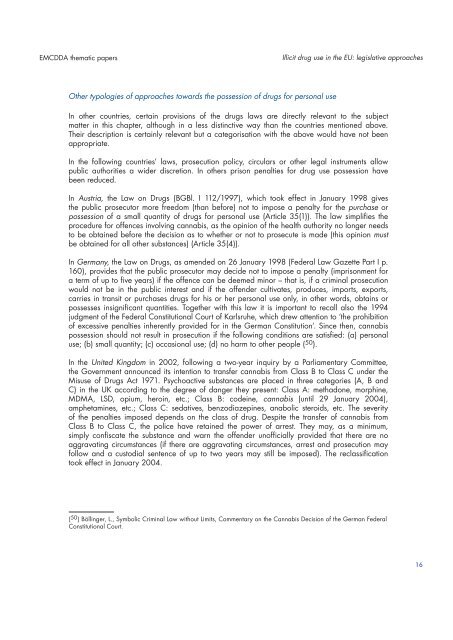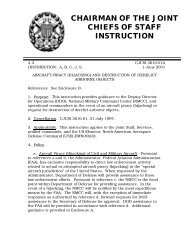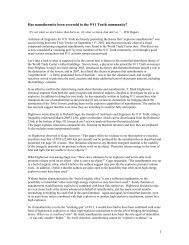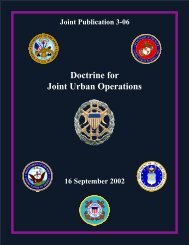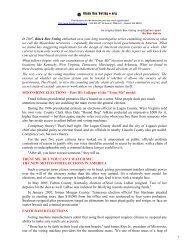illicit drug use in the eu: legislative approaches - EMCDDA - Europa
illicit drug use in the eu: legislative approaches - EMCDDA - Europa
illicit drug use in the eu: legislative approaches - EMCDDA - Europa
You also want an ePaper? Increase the reach of your titles
YUMPU automatically turns print PDFs into web optimized ePapers that Google loves.
<strong>EMCDDA</strong> <strong>the</strong>matic papersIllicit <strong>drug</strong> <strong>use</strong> <strong>in</strong> <strong>the</strong> EU: <strong>legislative</strong> <strong>approaches</strong>O<strong>the</strong>r typologies of <strong>approaches</strong> towards <strong>the</strong> possession of <strong>drug</strong>s for personal <strong>use</strong>In o<strong>the</strong>r countries, certa<strong>in</strong> provisions of <strong>the</strong> <strong>drug</strong>s laws are directly relevant to <strong>the</strong> subjectmatter <strong>in</strong> this chapter, although <strong>in</strong> a less dist<strong>in</strong>ctive way than <strong>the</strong> countries mentioned above.Their description is certa<strong>in</strong>ly relevant but a categorisation with <strong>the</strong> above would have not beenappropriate.In <strong>the</strong> follow<strong>in</strong>g countries’ laws, prosecution policy, circulars or o<strong>the</strong>r legal <strong>in</strong>struments allowpublic authorities a wider discretion. In o<strong>the</strong>rs prison penalties for <strong>drug</strong> <strong>use</strong> possession havebeen reduced.In Austria, <strong>the</strong> Law on Drugs (BGBl. I 112/1997), which took effect <strong>in</strong> January 1998 gives<strong>the</strong> public prosecutor more freedom (than before) not to impose a penalty for <strong>the</strong> purchase orpossession of a small quantity of <strong>drug</strong>s for personal <strong>use</strong> (Article 35(1)). The law simplifies <strong>the</strong>procedure for offences <strong>in</strong>volv<strong>in</strong>g cannabis, as <strong>the</strong> op<strong>in</strong>ion of <strong>the</strong> health authority no longer needsto be obta<strong>in</strong>ed before <strong>the</strong> decision as to whe<strong>the</strong>r or not to prosecute is made (this op<strong>in</strong>ion mustbe obta<strong>in</strong>ed for all o<strong>the</strong>r substances) (Article 35(4)).In Germany, <strong>the</strong> Law on Drugs, as amended on 26 January 1998 (Federal Law Gazette Part I p.160), provides that <strong>the</strong> public prosecutor may decide not to impose a penalty (imprisonment fora term of up to five years) if <strong>the</strong> offence can be deemed m<strong>in</strong>or – that is, if a crim<strong>in</strong>al prosecutionwould not be <strong>in</strong> <strong>the</strong> public <strong>in</strong>terest and if <strong>the</strong> offender cultivates, produces, imports, exports,carries <strong>in</strong> transit or purchases <strong>drug</strong>s for his or her personal <strong>use</strong> only, <strong>in</strong> o<strong>the</strong>r words, obta<strong>in</strong>s orpossesses <strong>in</strong>significant quantities. Toge<strong>the</strong>r with this law it is important to recall also <strong>the</strong> 1994judgment of <strong>the</strong> Federal Constitutional Court of Karlsruhe, which drew attention to ‘<strong>the</strong> prohibitionof excessive penalties <strong>in</strong>herently provided for <strong>in</strong> <strong>the</strong> German Constitution’. S<strong>in</strong>ce <strong>the</strong>n, cannabispossession should not result <strong>in</strong> prosecution if <strong>the</strong> follow<strong>in</strong>g conditions are satisfied: (a) personal<strong>use</strong>; (b) small quantity; (c) occasional <strong>use</strong>; (d) no harm to o<strong>the</strong>r people ( 50 ).In <strong>the</strong> United K<strong>in</strong>gdom <strong>in</strong> 2002, follow<strong>in</strong>g a two-year <strong>in</strong>quiry by a Parliamentary Committee,<strong>the</strong> Government announced its <strong>in</strong>tention to transfer cannabis from Class B to Class C under <strong>the</strong>Mis<strong>use</strong> of Drugs Act 1971. Psychoactive substances are placed <strong>in</strong> three categories (A, B andC) <strong>in</strong> <strong>the</strong> UK accord<strong>in</strong>g to <strong>the</strong> degree of danger <strong>the</strong>y present: Class A: methadone, morph<strong>in</strong>e,MDMA, LSD, opium, hero<strong>in</strong>, etc.; Class B: code<strong>in</strong>e, cannabis (until 29 January 2004),amphetam<strong>in</strong>es, etc.; Class C: sedatives, benzodiazep<strong>in</strong>es, anabolic steroids, etc. The severityof <strong>the</strong> penalties imposed depends on <strong>the</strong> class of <strong>drug</strong>. Despite <strong>the</strong> transfer of cannabis fromClass B to Class C, <strong>the</strong> police have reta<strong>in</strong>ed <strong>the</strong> power of arrest. They may, as a m<strong>in</strong>imum,simply confiscate <strong>the</strong> substance and warn <strong>the</strong> offender unofficially provided that <strong>the</strong>re are noaggravat<strong>in</strong>g circumstances (if <strong>the</strong>re are aggravat<strong>in</strong>g circumstances, arrest and prosecution mayfollow and a custodial sentence of up to two years may still be imposed). The reclassificationtook effect <strong>in</strong> January 2004.( 50 ) Böll<strong>in</strong>ger, L., Symbolic Crim<strong>in</strong>al Law without Limits, Commentary on <strong>the</strong> Cannabis Decision of <strong>the</strong> German FederalConstitutional Court.16


